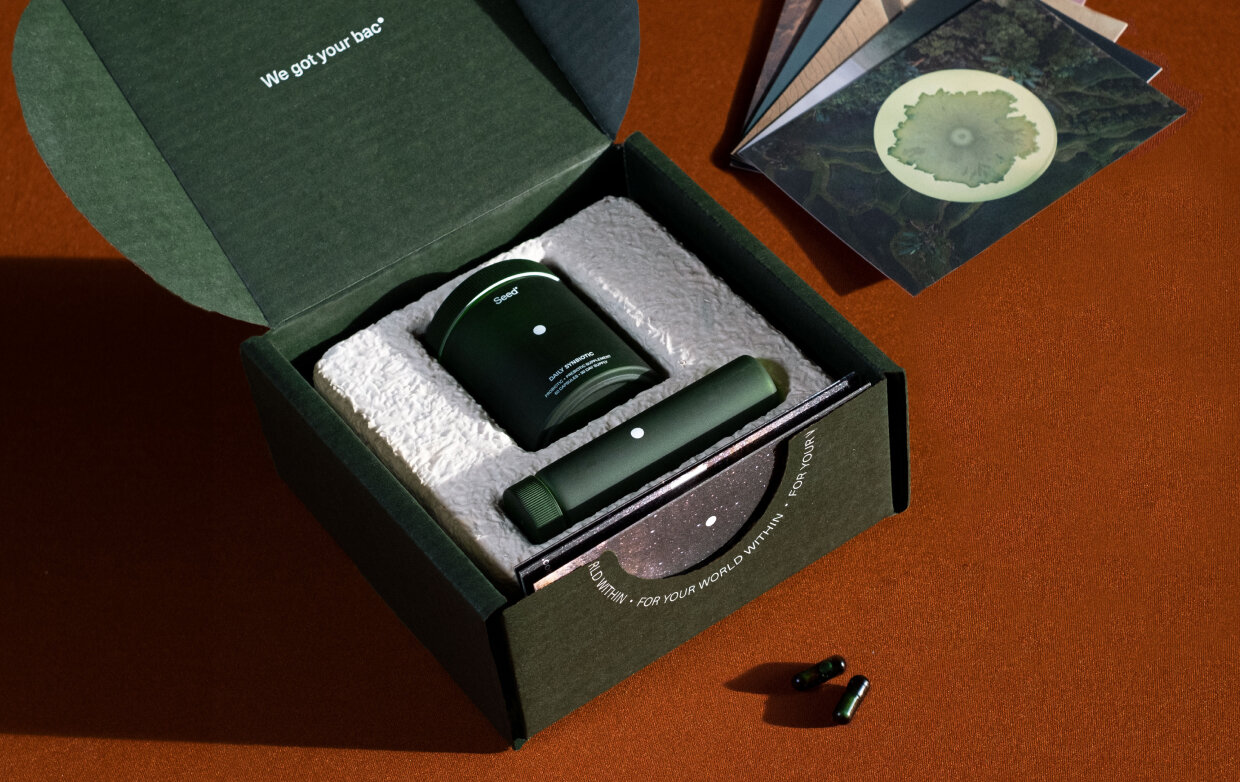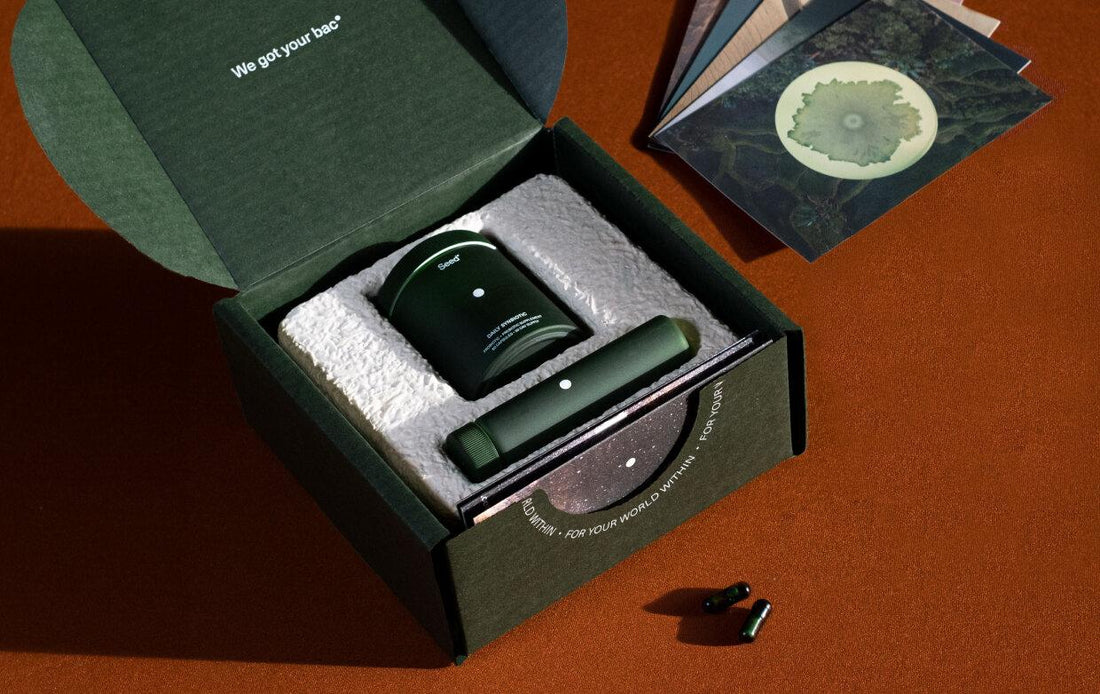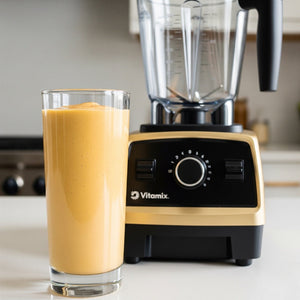
This article originally appeared on Seed and contains affiliate links.
The holiday season is a time of reflection and reconnection. It’s also a time of overindulgence, stress, and sickness. We tend to abandon our routines, deprioritize our health, and come January, seek atonement through resolutions we often fail to keep—a pattern most of us have experienced and recognize.
And just as hard as the holidays can be on the ‘human’ half of your biology, they also take a toll on your ‘microbial’ half, or your microbiome—the community of 38 trillion microorganisms, mostly bacteria, that live in and on you (1). Over the last decade, research has shown that our resident microbes play a significant role in everything from digestive and cardiovascular health to cognitive and immune function (2). In other words, when our microbiome is impacted, our whole body can be, too.
Reminder: health is a verb. It’s something you do, not something you have. It’s a compounding of all your active, daily choices—in December, January, or any other time of year. And health is building resilience, in order to maintain homeostasis—the ability of an organism or environment to maintain a state of internal balance and physical wellbeing in spite of changes or outside factors.
So at a time when disruption to your body, your microbiome, and your wellbeing is almost guaranteed, what do you do? We have some ideas. Below, 7 tips to nourish, nurture, and consider your microbiome throughout the holiday season.
1. Control Your Sweet Tooth
From pumpkin pie and apple crisp to peppermint bark and gingerbread people, the holidays are a proverbial minefield of sucrose and fructose. One of the season’s most signature sweets, the candy cane, is basically nothing but sugar.
You probably already know many of the health risks associated with these addictive carbohydrates—cavities, obesity, diabetes, heart disease. Turns out, they are just the tip of the iceberg when it comes to sugar’s impact on our biology.
A 2018 Yale study found that simple sugars can block the production of a key protein that promotes the colonization of beneficial bacteria (3). And a 2015 Oregon State study found that high sugar diets can impair memory function via the gut-brain axis (4).
To keep good bacteria in your gut, keep the visions of sugar-plums out of your head.
(Tip: if you’re still craving something sweet, try natural, fiber-dense sources like berries (5) or sweet potatoes (6).)
2. Leave (A Lot Of) Room For Vegetables
When you’re staring down a spread of turkey, gravy, mashed potatoes, stuffing, and macaroni and cheese, it can be tempting to ignore the vegetables, greens, and legumes on the table (assuming they’re on the menu to begin with).
While the holiday classics may fill you up, they invariably leave your microbiome wanting more. That’s because gut bacteria primarily subsist on plant-based fiber found in beans, nuts, whole grains, fruits, and vegetables (7). That’s right—fiber isn’t just for pooping.
A study by the American Gut Project found that people who eat more than 30 different plant types each week have the highest gut microbial diversity (8). And a diverse microbiome is one of the primary indicators of gastrointestinal and overall health (9).
So go ahead and be that person who brings broccoli to the Friendsgiving potluck.
(Tip: cruciferous vegetables like broccoli, cabbage, and cauliflower contain compounds that your gut bacteria can metabolize into beneficial nutrients (10).)
3. Take It Easy On The Eggnog
From open bar office parties to raucous family gatherings, the holiday season provides plenty of opportunities to let your hair down. A survey conducted by OnePoll in 2018 found that Americans double their alcohol intake between Thanksgiving and New Years.
Like sugar, the long term effects of alcohol on the body are well understood—liver dysfunction, brain damage, heart disease, stomach cancer. But it’s only recently that researchers have begun to explore the impact it has on the microbiome.
A 2016 study published in Cell showed that chronic alcohol consumption can lead to intestinal dysbiosis and bacterial overgrowth, which can, in turn, increase the risk of liver disease through a recently discovered pathway called the gut-liver axis (11).
So, if you do plan on ‘making merry’ this holiday season, do it in moderation.
(Tip: if you have a choice, ask for a glass of red wine! Your gut microbes love the polyphenols (12).)
4. Stick To Your Routines
Over the holidays, 1 in 3 Americans—over 100 million people—hit the road to spend time with friends and family, and it comes at a cost. Few activities are more disruptive to your body than travel, which can upend your diet, sleep, and exercise routines all at once.
Sudden shifts in diet, common among travelers, can alter the composition of your microbiome in less than 24 hours (13). Jet lag, a physiological condition that arises when your circadian rhythm is disturbed, can also negatively impact gut microbiota, who have their own circadian rhythm (14).
Skipping your morning run can be bad news for your microbes too, as regular exercise is a critical component of microbiome health (15). Still, for many of us, travel is unavoidable. What is avoidable are the many temptations along the way.
So, avoid the menagerie of airport snacks, make up for lost sleep, and find time to exercise.
(Tip: if you want to snack en route, pack something gut-friendly, like fresh fruit (16) or raw nuts (17).)
5. Manage Your Stress Levels
There is no shortage of reasons to stress out over the holidays—hanging lights, buying gifts, preparing feasts, hosting family, trying to keep your tree alive. Put together, this cocktail of emotional triggers can have a significant impact on our mental (and physical) health.
Many of us know from personal experience how connected our mood can be to our digestive system. Research into the gut-brain axis has revealed that cognitive conditions like anxiety and depression are a t least partially linked to inflammation in the gut (18).
Studies have also shown that stress can lead to changes in gut microbial composition, which can in turn affect our mood (19). A recent preliminary study even suggested that having dinner with your in-laws can negatively impact your microbiome (20).
Bottom line? Where you can avoid stress this holiday season, do it.
(Tip: a recent poll showed that most of us dread the idea of talking politics at Thanksgiving, suggesting we should all avoid starting unnecessary debates!)
6. Layer Up And Go Outside
For many of us, the only exposure we get to the ‘outdoors’ during the holidays is the Douglas fir we drag into the house. Some of us don’t even go that far, opting for an artificial tree instead. “Nature can wait until springtime,” we tell ourselves as we snuggle up on the couch.
We now know the natural environment plays a pivotal role in shaping our health from a young age. A teaspoon of healthy soil alone contains up to 1 billion microorganisms. The more exposure we get to them, the richer and more resilient our own microbiome tends to be (21).
Turns out, the built environment (read: your living room or hotel room) has a microbiome too, and it is much less diverse than the great outdoors. According to a recent study published in Nature, that’s causing issues, from impaired immune function to antibiotic resistance (22).
So, get outside this winter, and let your microbes reunite with their old friends.
(Tip: to foster a healthier environmental microbiome in your home, buy more plants (23), and use fewer antibiotic cleaning products (24).)
7. Take A Daily Probiotic
The holidays often come like a tidal wave, sweeping us off our feet and out of the routines we’ve built to keep ourselves happy and healthy. Many of us don’t find footing again until January. As you’ve learned, it doesn’t have to be this way.
Each of us is capable of making daily choices that foster better health. Beyond diet and lifestyle adjustments, probiotics (and prebiotics) are complementary tools you can use to take care of your ‘microbial’ half—and your human half too.
Scientifically-validated probiotics can have many whole-body benefits, from shortening the duration of the common cold and increasing the efficacy of the flu shot to helping maintain digestive health during travel and mitigating alcohol-induced gut permeability.
Seed’s Daily Synbiotic (probiotics + prebiotics) includes strains clinically-validated for systemic benefits including digestive health, skin health, heart health, and gut immune function.
(Tip: Seed’s Daily Synbiotic also makes for a unique, how-did-you-think-of-that gift!)
Health is often sacrificed during the holidays—weather prohibits outdoor exercise, celebrations include higher sugar content, travel and family can contribute to stress, and shopping and planning mean our priorities shift away from self-care.
As we all go home for the holidays this year, arm yourself with these 7 considerations, and remember that your body is your first home—both to yourself, and to the community of 38,000,000,000,000 invisible microorganisms that depend on you for survival, and take care of you in exchange.
——————————
1. https://www.ncbi.nlm.nih.gov/pmc/articles/PMC4991899/
2. https://journals.sagepub.com/doi/full/10.1177/2397847317741884
3. https://news.yale.edu/2018/12/17/sugar-targets-gut-microbe-linked-lean-and-healthy-people
4. https://www.sciencedaily.com/releases/2015/06/150622182034.htm
5. https://www.ncbi.nlm.nih.gov/pmc/articles/PMC6315720/
6. https://www.ffhdj.com/index.php/ffhd/article/view/361
7. https://www.ncbi.nlm.nih.gov/pubmed/29902436
8. https://health.ucsd.edu/news/releases/Pages/2018-05-15-big-data-from-worlds-largest-citizen-science-microbiome-project-serves-food-for-thought.aspx
9. https://www.nature.com/articles/nature11234
10. https://www.ncbi.nlm.nih.gov/pmc/articles/PMC2728691/
11. https://www.cell.com/cell-host-microbe/fulltext/S1931-3128(16)30002-6?_returnURL=https%3A%2F%2Flinkinghub.elsevier.com%2Fretrieve%2Fpii%2FS1931312816300026%3Fshowall%3Dtrue
12. https://www.ncbi.nlm.nih.gov/pubmed/31472153
13. https://www.ncbi.nlm.nih.gov/pmc/articles/PMC3957428/
14. https://www.ncbi.nlm.nih.gov/pmc/articles/PMC5909328/
15. https://www.ncbi.nlm.nih.gov/pmc/articles/PMC5357536/
16. https://link.springer.com/article/10.1007/s10068-018-0372-7
17. https://www.sciencedaily.com/releases/2018/05/180503175033.htm
18. https://www.ncbi.nlm.nih.gov/pmc/articles/PMC5641835/
19. https://www.ncbi.nlm.nih.gov/pmc/articles/PMC6389720/
20. https://www.sciencedirect.com/science/article/pii/S2452231719300090
21. https://www.mdpi.com/2076-2607/7/9/287/htm
22. https://www.nature.com/articles/s41467-019-08864-0
23. https://www.ncbi.nlm.nih.gov/pmc/articles/PMC6290261/
24. https://academic.oup.com/pch/article/11/3/169/4560373





